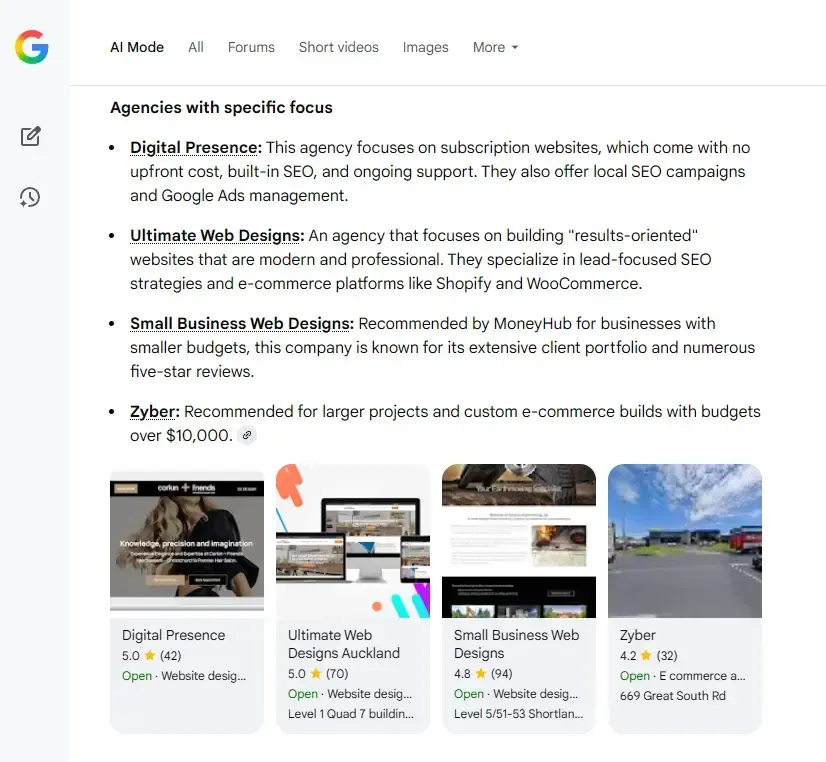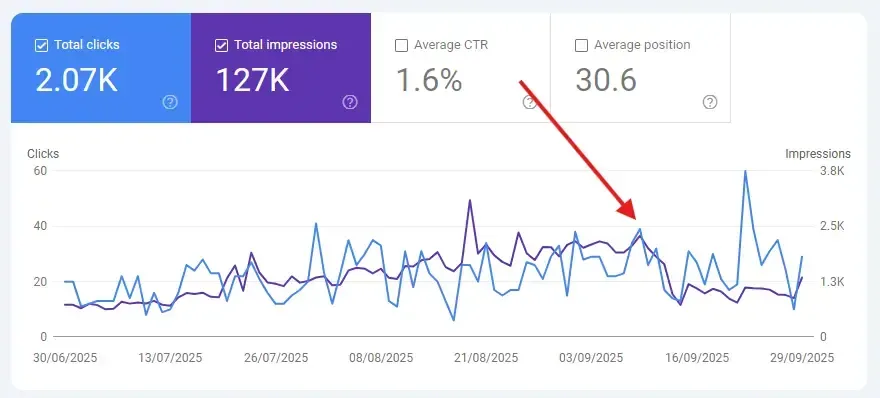How Digital Presence builds websites for the future of AI search
The way people search online is changing fast. It’s no longer just about ranking in Google’s “10 blue links.” Increasingly, users are asking AI-powered tools like ChatGPT, Claude, Perplexity, and even Google’s AI Overviews for answers.
For small business owners, this shift raises an important question: will your website still be found in an AI-first search world?
At Digital Presence, we build websites not just for today, but for the future of search. Thanks to the Duda platform we use, your site is already ahead of the curve — with built-in tools like llms.txt that make your content AI-friendly by default.
What is AI search (and why it matters to your business)?
AI search is different from traditional search engines. Instead of simply showing a list of websites, AI tools:
- Read and understand content across the web.
- Summarise answers in conversational language.
- Pull details from multiple sources at once.
That means your customers may never click on a Google link at all — they’ll get an answer directly from an AI assistant.
For businesses, this creates both a risk and an opportunity:
- Risk: If your site isn’t optimised for AI, you may disappear from customer conversations.
- Opportunity: If your site is AI-friendly, you could be the source that these tools reference.

Meet llms.txt: a new standard for AI-friendly websites
Duda recently introduced llms.txt, a behind-the-scenes file that acts as a guide for AI systems.
Think of it as:
- robots.txt for search engines → tells Google what to crawl.
- llms.txt for AI models → tells AI tools what your site is about.
Every time we build and publish a site for you, Duda automatically generates llms.txt. It includes:
- A clean list of live URLs (blogs, service pages, products).
- Meta descriptions and titles for each page.
- Excludes draft and no-index pages.
The result? When AI tools read your site, they’re more likely to:
- Show accurate information about your business.
- Link to your real content.
- Represent your brand professionally.
Why this gives your business an edge
Most websites today don’t have llms.txt. That means your Digital Presence site has a built-in competitive advantage.
In practical terms, this means:
- If someone asks ChatGPT “Who are the best web designers in Christchurch?”, your site has a better chance of being referenced.
- If a local searches “best café in Rolleston”, and your café uses a Duda-built site, AI tools have a clear roadmap of your content to draw from.
- If a user looks for “affordable carpet cleaning in Kaiapoi”, your service page is easier for AI to parse and recommend.

Beyond AI: the fundamentals still matter
While llms.txt is a big leap forward, it’s not a magic bullet. Search visibility still relies on the fundamentals:
- Speed and performance
- Fast-loading sites keep users engaged.
- Core Web Vitals are still key ranking factors.
- Design and usability
- A site that looks great and is easy to use keeps visitors on the page.
- User-friendly design signals quality to both Google and AI.
- SEO best practices
- Strong content, relevant keywords, and on-page SEO remain essential.
- Local SEO is critical for Christchurch and Canterbury businesses.
- Mobile-first experience
- Most searches (human and AI) start on mobile. Your site must look perfect on every device.
- Trust and authority
- Regular updates, customer testimonials, and accurate business details all reinforce EEAT — signals Google and AI rely on.
How Digital Presence builds AI-ready websites
At Digital Presence, every website we deliver includes:
- No upfront cost: Get started without risk.
- Built-in SEO: On-page optimisation, clean structure, and keyword-friendly content.
- AI optimisation: llms.txt auto-generated with every publish.
- Ongoing support: 15 minutes of editing time each month included.
- User-first design: Clean, modern, and mobile-friendly sites.
We combine Duda’s technology with local SEO expertise to create websites that don’t just look good today but are built to thrive in the AI-driven search landscape.

Practical steps for businesses in Christchurch and Canterbury
If you’re a small business owner wondering how to prepare, here are simple steps you can take:
- Check your site for llms.txt
- Go to your website URL and add
/llms.txtto the end. - If you see a clean map of your site, you’re AI-ready.
- Keep your content fresh
- Blog posts, service updates, and news items help AI tools understand your relevance.
- Optimise your Google Business Profile
- AI often pulls from GBP listings. Keep your hours, reviews, and services up to date.
- Focus on clarity
- Write in plain English. AI tools prefer clear, structured content over jargon.
- Work with experts
- Partner with web designers (like us) who understand SEO and AI trends.
The future of search is hybrid
It’s unlikely that AI will completely replace Google search. Instead, customers will use a mix of AI assistants, traditional search, and local platforms to find businesses.
That’s why your website needs to be:
- Search engine optimised.
- AI search optimised.
- User experience optimised.
At Digital Presence, we make sure you’re covered on all fronts.
Search is evolving — and your business can’t afford to be left behind. With AI tools shaping the way people discover information, having an AI-optimised website is no longer optional.
By building on Duda, Digital Presence ensures your site includes llms.txt, a powerful new tool that makes your business easier for AI to understand and recommend. Combined with speed, design, SEO, and local expertise, our websites are built to bring you customers today and keep you visible in the future.
Ready for a website that works in both Google and AI search? Book a free chat with Digital Presence today.











